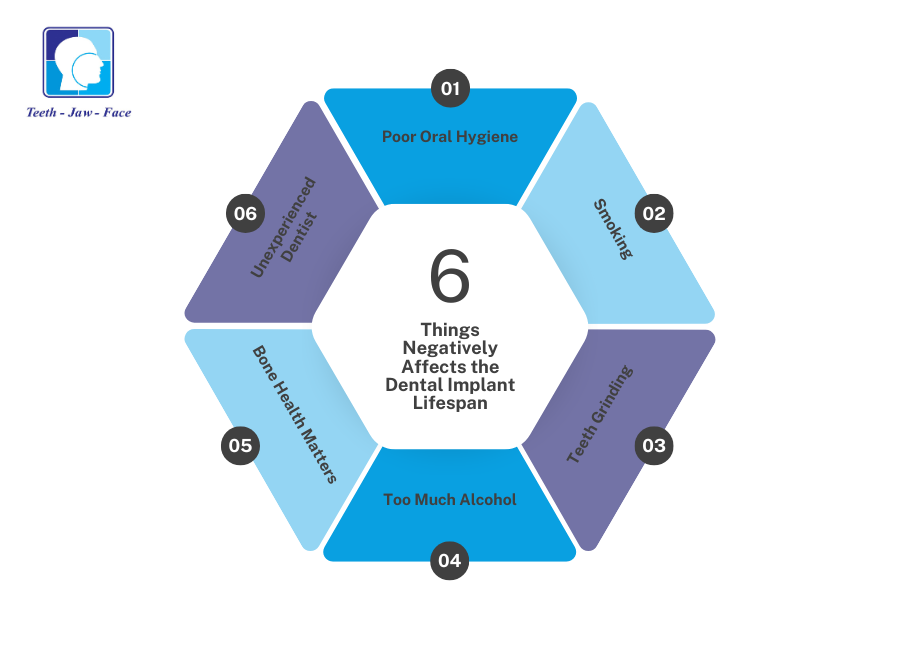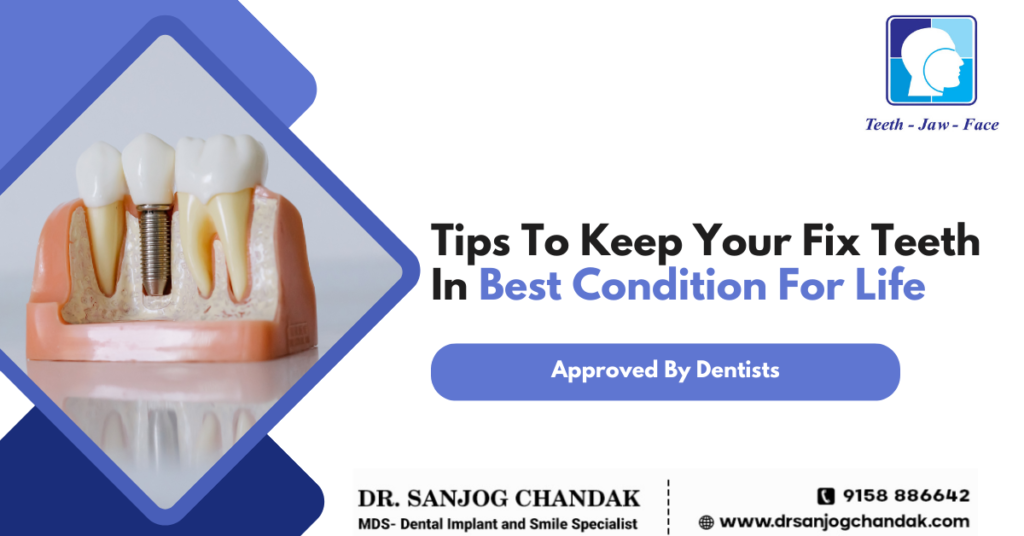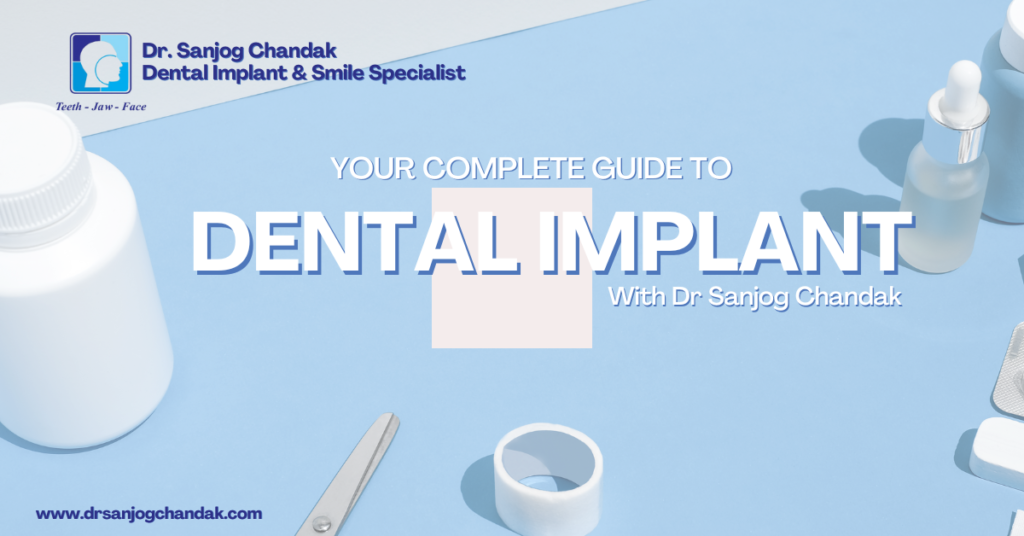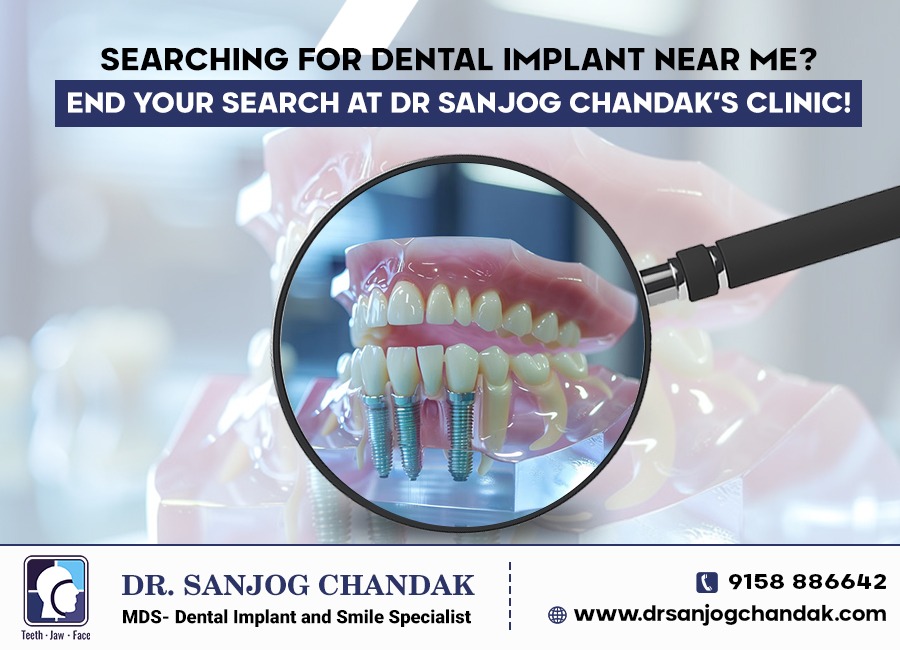Have you ever thought about how long a dental implant really lasts?
If you’re considering one or already have one, you probably want it to stay strong for life—after all, no one wants to go through the process twice! The fact is, Implants are built to last, but just like anything else, they need a little care to stay effective in the long run.
From brushing habits to lifestyle choices, small things can make a big difference in how long your implant stays healthy. In this guide, we’ll see what negatively affects a dental implant’s lifespan and share simple, practical tips to help you keep your smile strong and confident for years to come!
The tips and every detail covered in this blog is reviewed by Dr Sanjog Chandak – MDS, Dental Implant & Smile Specialist in Nagpur.
What Negatively Affects the Dental Implant Lifespan
We know that a dental implant can return your confident smile and help you eat and drink like before, but its longevity depends on how well you care for it. Here are some key factors that can affect how long your implant lasts:
1. Poor Oral Hygiene
Just like natural teeth, implants need daily care. Skipping brushing or flossing can lead to infections like peri-implantitis, which weakens the implant over time. A simple routine can make all the difference!
2. Smoking
Smoking doesn’t just harm your lungs, it slows healing and reduces blood flow to your gums, making implant failure more likely. Quitting (or at least cutting back) can greatly improve your implant’s success.
3. Teeth Grinding (Bruxism)
Grinding your teeth at night puts extra stress on your implant, which can cause cracks or even loosening. If you grind your teeth, your dentist may recommend a night guard to protect your smile.
4. Too Much Alcohol
Enjoying a drink occasionally is good, but excessive alcohol can slow healing and weaken your immune system, making your implant more vulnerable to complications.
5. Bone Health Matters
Your implant needs a strong foundation like a house needs a solid ground. If your jawbone is too thin or weak, you may need a bone graft to ensure your implant stays secure.
6. Visiting Unexperienced Dentist
A dentist’s experience can make all the difference. Poor implant placement can lead to discomfort, infections, or even failure. Always trust a specialist who knows their craft!
By taking care of your implant and making small lifestyle adjustments, you can ensure it stays strong for years—giving you a smile that lasts a lifetime!

Tips To Maintain Longevity Of Fix Teeth
Fixed teeth, whether dental implants, crowns, or bridges, require proper care to ensure they last for decades. Research shows that with good oral hygiene (even our mom & teacher in school said this) and professional maintenance, fixed teeth can last 10–30 years or even a lifetime.
Follow these evidence-based tips to protect your precious investment:
1. Maintain Proper Oral Hygiene
- Studies confirm that brushing twice daily with fluoride toothpaste reduces plaque and bacterial buildup, preventing decay around fixed teeth.
- Flossing removes up to 80% of plaque from areas that a toothbrush cannot reach. Special floss, interdental brushes, or water flossers are recommended for bridges and implants.
2. Avoid Hard & Sticky Foods
- Chewing on hard foods like ice, nuts, or hard candy increases the risk of damage the crown or breaking dental bridges.
- Sticky foods like caramel, toffee, and gum can pull crowns loose or increase plaque retention, raising the risk of decay.
3. Schedule Regular Dental Checkups
- The American Dental Association (ADA) recommends biannual dental visits to detect early signs of wear, fractures, or gum infections.
- Professional cleanings remove tartar, which cannot be eliminated through regular brushing and flossing.
- A study published in the Journal of Periodontology found that patients with regular dental visits had a 50% lower risk of implant failure.
4. Wear a Mouthguard if Needed
- Bruxism (teeth grinding) can exert excessive pressure, causing fractures in crowns and implant-supported prosthetics.
- Custom-fitted mouthguards reduce the force by up to 70%, protecting both natural and artificial teeth.
5. Avoid Smoking & Limit Alcohol
- A study from the National Library Of Medicine says smokers have a 140% higher risk of implant failure due to poor gum healing.
- Excessive alcohol consumption can weaken enamel, making it easier for bacteria to cause decay around fixed restorations.
6. Eat a Balanced Diet
- Calcium and vitamin D intake is crucial for strong jawbone support, reducing the risk of implant failure.
- Crunchy fruits and vegetables like apples and carrots stimulate saliva production, which naturally cleans the mouth and reduces plaque buildup.
7. Address Dental Issues Promptly
- Sensitivity, pain, or mobility of a fixed tooth can indicate underlying issues such as infection or loosening.
- Delaying treatment can lead to bone loss, crown failure, or gum disease, which may require expensive corrective procedures.
Practising the above things, and visiting the dentist regularly (at least once in a 4 month) can help maximize the longevity of your restorations. Want expert dental consultation? Connect with us now!
With our 15+ years of experience in successful 1000+ dental implants and smile makeovers, our dentist assures you get the value of your investment. Dial us at 91588 86642 to book your appointment.





